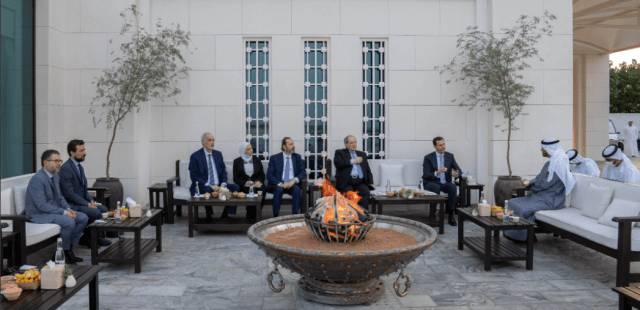
The Syrian and UAE delegations meeting underlined Dubai’s diplomatic efforts to play a decisive role in the Middle Eastern geopolitics and international arena.
The Syrian President Bashar al-Assad visited the United Arab Emirates and met Sheikh Mohammed bin Rashid Al-Maktoum, Vice President and Prime Minister of the UAE and Ruler of Dubai, at His Highness’ rest in Al Marmoom in Dubai.
From the Emirati side, the meeting was attended by Sheikh Hamdan bin Mohammed bin Rashid Al Maktoum, Crown Prince of Dubai, Sheikh Maktoum bin Mohammed bin Rashid Al Maktoum, Deputy Ruler of Dubai, Deputy Prime Minister and Minister of Finance, Sheikh Mansour bin Zayed Al Nahyan, Deputy Prime Minister and Minister of Presidential Affairs, and Mohammed bin Abdullah Al Gergawi, Minister of Cabinet Affairs, His Excellency Anwar bin Mohammed Gargash, diplomatic advisor to His Highness the President of the State, Ali bin Hammad Al Shamsi, Deputy Secretary-General of the Supreme National Security Council, and Talal Humaid Belhoul Al Falasi, Director-General of the State Security Apparatus in Dubai. The Syrian delegation led by President Bashar al-Assad included Faisal Miqdad, Minister of Foreign Affairs and Expatriates, Mansour Azzam, Minister of Presidential Affairs, and Bashar al-Jaafari, Deputy Minister of Foreign Affairs and Expatriates.
During the meeting, Sheikh Mohammed bin Rashid welcomed the visit of President al-Assad and the accompanying delegation and expressed his sincere wishes for Syria and its people for security, stability, peace, and prosperity prevail throughout the region.
The meeting dealt with the relations between the two countries and the prospects for expanding the circle of bilateral cooperation, especially at the economic, investment and commercial levels.
Sheikh Mohammed bin Zayed, who received President al-Assad at Al-Shati Palace, considered that this visit comes within the framework of the common concern to continue consultation and fraternal coordination between the two countries on various issues, stressing that Syria is an essential pillar of Arab security, and therefore the UAE position is consistent in its support for the Syrian unity territory and its stability, highlighting the need for the withdrawal of all foreign forces illegally present on Syrian territory.
President al-Assad underlined that the UAE is a country that plays a significant role given the balanced policies that it pursues towards international issues, pointing out that the world is changing and moving for a long time towards a state of instability.
Why does it matter?
The United Arab Emirates aims to play a prominent role in Middle Eastern dynamics and international relations. In the last years, to grow in the ranking of global powers, Dubai has intervened in conflicts such as Syria, Yemen, Somalia, Afghanistan and Libya, arising at least as a regional power even though the Emirates strategy did not help solve the conflict or to bring stability. The UAE might promote its foreign policy thanks to the world’s seventh-largest oil deposits that allowed Dubai to invest in national infrastructure to become one of the world’s wealthiest countries and expand its financial presence abroad, including Syria.
Syria still has a strategic role in the Middle East. However, in the last years, the Western countries have paid not great attention to local dynamics leaving the Russian Federation, Iran, Turkey and regional actors such as the UAE, Saudi Arabia and Qatar competing with each other to influence this Middle Eastern country.
The meeting between Syrian President Bashar al-Assad and Sheikh Mohammed bin Rashid Al-Maktoum highlighted the Emirati attempt to normalise relations with Syria. Nevertheless, other Gulf Arab monarchies, especially Saudi Arabia, have been reluctant about the Syrian reintegration into the Arab fold. Considering that Russia and Iran dominate the Syrian arena at the moment, the UAE is trying to become a potential counter-balance actor in the country and play a significant role in the Middle Eastern geopolitical dynamics.
On the Syrian side, President Bashar al-Assad attempts to diversify its international partners, normalise the relations with other Arab countries and attract foreign direct investments (FDIs) necessary to reconstruct the country heavily damaged by the war. In this regard, also considering the harrowing moment that the Russian Federation is witnessing due to the Ukraine conflict and the connected Western sanctions (Russian invasion of Ukraine and economy), Syria is looking at other partners to improve socioeconomic development, gain international support, and contrast domestic opposition.



